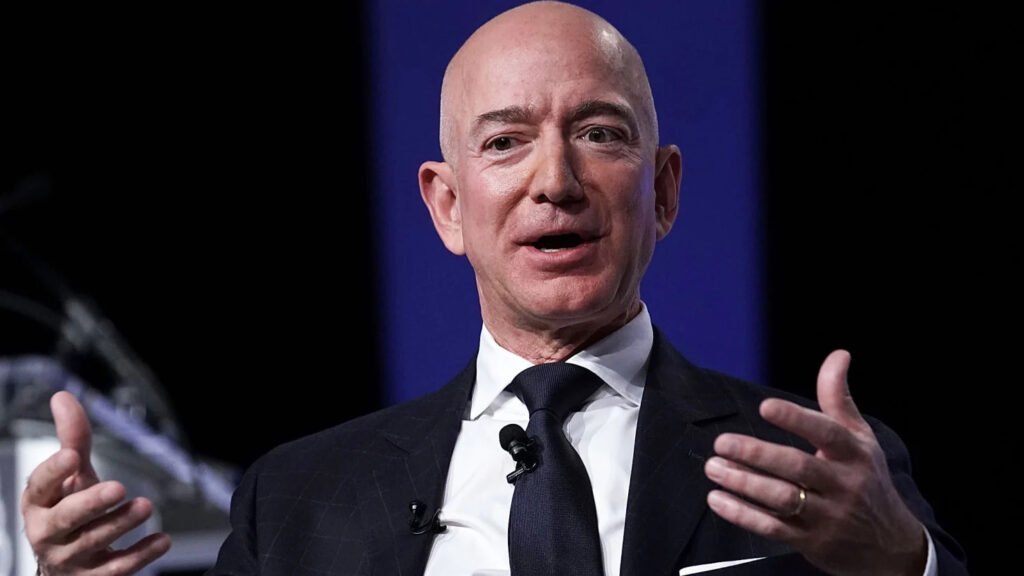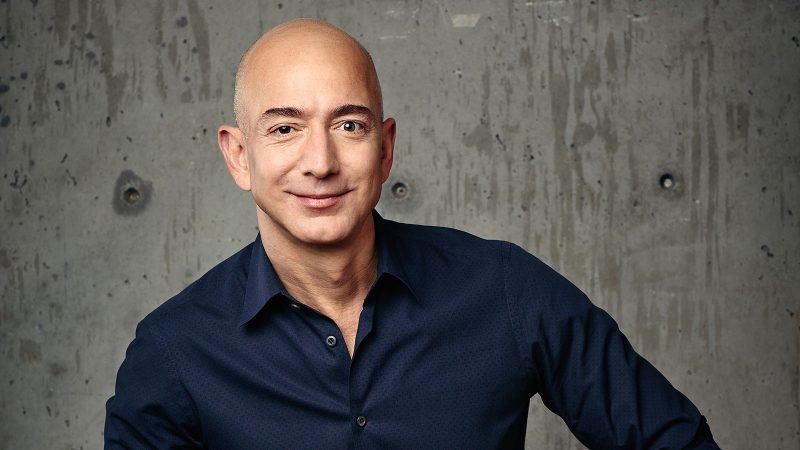Table of Contents
ToggleTop 10 Interesting and Amazing Facts About Jeff Bezos
The founder, executive chairman, and former CEO of Amazon, the largest cloud computing and e-commerce company in the world, is Jeffrey Preston Bezos, also known as Jeff Bezos. With an astonishing net worth of $213 billion as of October 16, 2024, Bezos is the second richest person in the world, according to Forbes.
Born in Albuquerque, New Mexico, Jeff Bezos grew up in Miami, Florida, and Houston, Texas. In 1986, he received degrees in computer science and electrical engineering from Princeton University. From 1986 to 1994, Bezos worked in a variety of capacities on Wall Street before starting his own business.

While traveling across the country from New York City to Seattle in the middle of 1994, Jeff Bezos started Amazon, which was first an online book retailer. As time went on, Amazon evolved into the world’s biggest online retailer, providing goods and services including cloud computing, music streaming, video streaming, and artificial intelligence. As the largest online retailer in the world today, Amazon is dominated by its cloud infrastructure and virtual assistant services subsidiary, Amazon Web Services (AWS).
Bezos established Blue Origin, an aerospace manufacturing and spaceflight corporation, in 2000, realizing his goal of living beyond Earth. 2015 saw the successful launch of Blue Origin’s New Shepard spacecraft, a noteworthy accomplishment in suborbital space exploration. Bezos conducted a historic first-hand space flight in 2021 using Blue Origin NS-16, a private spacecraft.
In this comprehensive blog, we’ll uncover ten interesting and little-known facts about Jeff Bezos, delving into his personal life, career, and ventures.
1. The Early Influence: Grandfather’s Ranch in Texas
While a lot of people are aware that Jeff Bezos was born in Albuquerque, New Mexico, not many are aware of the significant influence that summers spent at his grandfather’s Texas ranch had on his development. Bezos worked on the ranch for a large portion of his early years, when he discovered his passion for machines and problem-solving.
Bezos attributes his practical abilities and passion in science and invention to his maternal grandpa, Lawrence Preston Gise, a former atomic energy official. Bezos developed his early interest in mechanics on this ranch, where he also learned how to fix windmills and tractors. This fascination would later shape his pursuit of technology.
Working with machines firsthand gave Bezos the entrepreneurial drive and love of technology that would ultimately define his career.
2. The Modest Beginnings of Amazon in a Garage
The establishment of Amazon is among the most well-known components of Jeff Bezos’ success story, but the specifics of how it got its start are less well-known. When Bezos first started Amazon in 1994, he was selling books out of his Seattle garage. He would pack the books himself, drive them to the post office, and mail them to consumers along with a small group of workers.
The extraordinary amount of risk Bezos took to launch Amazon is less well understood. Resigning from a lucrative Wall Street position, he persuaded his parents to contribute a substantial amount of their life savings to his startup business. Although it was a significant leap of faith at the time, the gamble paid off handsomely.
Bezos’s ability to understand the internet’s promise as a platform for business allowed Amazon to grow from a small, independent bookstore into a major player in the worldwide e-commerce industry.
3. A Workaholic Who Values Sleep
Bezos is sometimes characterized as an unrelenting worker, although he also values relaxation and sleep. Bezos has stated in multiple interviews that he tries to get eight hours of sleep every night. He credits his good sleep for his capacity to make wise decisions.
“I think better,” he said. I’m more energized. I feel happier now.” This dedication to relaxation demonstrates that Bezos recognizes the importance of long-term productivity and mental wellness for someone in charge of a trillion-dollar corporation.
Bezos shows that success doesn’t necessarily have to come at the expense of health by promoting a balanced lifestyle and challenging the conventional “work 24/7” mentality.
4. Beyond Earth: The Blue Origin Vision
Jeff Bezos’s goals extend beyond his role as CEO of Amazon. His passion for space exploration prompted him to establish Blue Origin, a spaceflight business dedicated to democratizing access to space travel, in 2000. His long-term goal is to create multiplanetary life because he thinks that in order for mankind to survive, it must spread beyond Earth.
According to Bezos, working on Blue Origin is his “most important project.” The company’s motto, “Gradatim Ferociter,” which translates to “Step by Step, Ferociously” in Latin, symbolizes his methodical yet persistent approach to creating space technologies and reusable rockets.
Inspired by his belief in the potential of the space sector, Bezos wants to use Blue Origin to help provide the foundation for future generations to live and work in space.
5. The Day One Fund of Bezos
Despite his reputation for financial skill, Jeff Bezos has had a substantial impact on philanthropy. With an initial pledge of $2 billion, he established the Bezos Day One Fund in 2018 to focus on two main issues: building high-caliber, full-scholarship preschools in low-income neighborhoods and offering refuge and assistance to homeless families.
In contrast to certain billionaires who prioritize global concerns, Bezos has opted to allocate his charitable contributions to projects that have an influence on the lives of people in the local neighborhood. According to him, the goal of his charitable endeavors is to create “lasting impact,” which is similar to his long-term strategy in business.
Bezos wants to bring about structural change, especially in areas that impact marginalized groups, as seen by his charitable endeavors.
6. Amazon’s Success Is Driven by Customer Obsession
Jeff Bezos’s preoccupation with client happiness is one of the most unique features of his company strategy. Bezos has positioned the client at the core of everything Amazon does from the company’s inception. His emphasis on providing customers with value through affordable prices, quick delivery, and a large selection of goods has contributed to Amazon becoming the industry leader it is today.
In interviews, Bezos often states that Amazon’s success stems from its unwavering emphasis on the demands of its customers. In Amazon meetings, the infamous “empty chair” stands in for the client, serving as a constant reminder to all present that their first priority is to fulfill the needs and interests of the consumer.
Bezos turned Amazon into a client-centric business that relies heavily on efficiency and innovation by keeping a laser-like focus on customer happiness.

7. A Reasonably Aware Risk-Taker
Bezos is no stranger to taking chances, but he never takes them carelessly. Bezos has taken several risks in his business career, such as starting Amazon Web Services (AWS) and purchasing Whole Foods, but he has always carefully considered the consequences of his choices.
One such is Amazon’s choice to use AWS to join the cloud computing space, a decision that initially baffled a lot of investors. AWS is currently one of Amazon’s most lucrative business units, so Bezos’ well-considered risk paid off handsomely.
Bezos strikes a risk-foresight balance, making sure that his audacious business decisions are supported by meticulous research and data and result in significant long-term gains.
8. Bezos’s Infatuation with Media’s Future
A lesser-known aspect of Bezos’s biography is his involvement with the media. His $250 million purchase of The Washington Post in 2013 caught many off guard. Despite having no prior media expertise, Bezos’ strategy of concentrating on digital expansion has been credited with turning the newspaper’s fortunes around.
The Washington Post gained prominence in the field of online journalism while it was owned by Bezos, growing both its digital footprint and subscription base. Bezos has insisted that he is more of a financial supporter than a hands-on manager, allowing the paper’s management to maintain editorial autonomy.
Bezos’ commitment to influencing digital media and guaranteeing the continued existence of high-caliber journalism in the internet era is evident in his investment in The Washington Post.
9. “Jeff Jorgensen” Was Almost the Name for Him
Jeffrey Preston Jorgensen was Jeff Bezos’ original birth name. After giving birth to him while still a teenager, his mother, Jacklyn Gise, remarried to Cuban immigrant Miguel Bezos. When Jeff was four years old, Miguel adopted him, renaming him Bezos.
A little-known aspect of Bezos’ biography, this one demonstrates the profound impact Miguel Bezos had on Jeff’s formative years. Miguel was an Exxon engineer who firmly believed that Jeff should pursue his academic goals.
The early events of Jeff Bezos’ life, particularly his familial dynamics, were crucial in forming the values and work ethic that have been the foundation of his success.
10. The Ten Thousand Dollar Amazon Door Desk
The story of Jeff Bezos’s invention of Amazon’s “door desks,” which dates back to the company’s infancy, is among the most well-known. Bezos emphasized the company’s thrift by having his workers construct desks out of four-by-fours and inexpensive doors in order to save money.
A common interpretation of this tale is that it embodies Amazon’s “Day 1” philosophy, which stresses maintaining lean operations, emphasizing customer value, and approaching every day as if it were the first. Despite Amazon’s growth into a multimillion dollar firm, the door desk continued to be a potent reminder of the company’s modest origins.
The door desk is an example of Bezos‘ innovation via thrift concept, showing that innovative problem-solving may result in long-term profitability.

